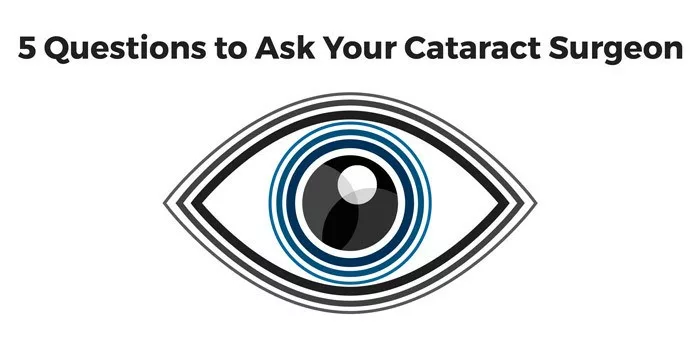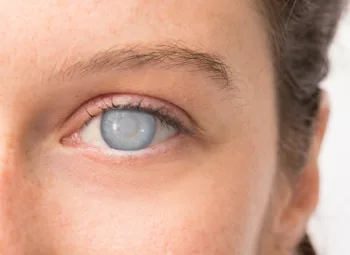We believe you should be fully empowered with all necessary information in order to choose the best cataract surgery solution for your needs and to feel fully comfortable going into the operating room. We’ve put together a list of 5 of the most important questions you MUST ask your cataract surgeon to help guide you through this process.

1. What’s the difference between traditional and advanced cataract surgery?
Most cataract surgeons either perform traditional or advanced cataract surgery.
In traditional cataract surgery, your eye surgeon will make a small incision in the side of your cornea with a hand-held blade to remove the clouded portion of the lens. Then, a small probe is inserted into your eye to induce a process called phacoemulsification. The probe will release ultrasonic waves that break up the clouded lens so that it can then be suctioned out by your surgeon.
Advanced laser cataract surgery uses a femtosecond laser to assist in cataract surgery. It is primarily computer-controlled, which helps to automate and safeguard some of the most traditionally challenging steps of cataract surgery. This laser can correct the shape (astigmatism) of the eye very precisely. Using this laser reduces the ultrasound time to complete the procedure. The end result is precise, safe, quick healing cataract surgery.
The new femtosecond laser-assisted cataract surgery (FLACS) is touted to improve the effectiveness, precision, outcome, and safety of traditional cataract surgery. Laser-assisted cataract surgery, along with the correct choice of intraocular lens (IOL) has made it possible for you to achieve the best uncorrected vision at distance, near and immediate distance.
2. Who will perform my cataract surgery?
It is common for a cataract surgery center to have several surgeons perform their cataract procedures. Every laser eye surgeon is different in their degree of experience, training, and qualifications, and without knowing which surgeon will be performing your surgery ahead of time it can be difficult to know their unique qualifications in advance.
At NeoVision Eye Center, your cataract surgery will be performed by the highly trained and well-respected Dr. Shobha Tandon, MD, PHD. Dr. Tandon was trained at Stanford University and is a certified LASIK Surgeon with over 18 years of experience performing cataract surgeries in the Bay Area.
She was voted “the Ophthalmologist of The Year” by the Consumer Research Council, awarded Honors by America’s Registry of Outstanding Professionals, and was recently named one of America’s Top Ophthalmologists by the Consumer Research Council.
3. What’s the difference between monofocal and multifocal lens implants?
In order to remove a cataract, your surgeon must remove the natural lens of your eye. After the cataract is removed, an artificial lens called an intraocular lens, or IOL, is inserted into the eye.
What many people do not know is that there are different types of intraocular lenses available to patients. IOL’s typically fall into two categories: MonoFocal and MultiFocal.
Monofocal lenses are used to restore vision for one area of focus. These lenses are usually used to restore distance vision. After having a monofocal lens implanted into your eye, you may still need glasses or bifocals after surgery.
Multifocal lenses provide high-quality vision at multiple distances. This lens can correct your vision for distance, up close, and everything in between. With a multifocal lens, you can achieve enhanced vision at a distinct distance customized to suit your lifestyle.
Multifocal lenses were created to improve upon the limitations of monofocal lenses and traditional cataract surgery. Previously after cataract surgery, restoring your distance vision would be the primary goal. Patients would still need to wear glasses or bifocals to restore their close-up vision.
For many, Multifocal IOL’s are the right choice if you value having both improved distance and reading vision but do not mind some compromise in your distance vision.
4. Will I still need glasses after surgery? For distance? For reading?
This is a very important question and is dependent on both the type of cataract surgery you receive (traditional or advanced) and the IOL you choose.
If you choose a monofocal IOL, your distance vision may be restored but you will likely still need glasses or bifocals after surgery to correct the shape of the eye (astigmatism) and/or close-up vision.
If you choose a multifocal IOL, you can restore both your distance and reading vision and will likely not need reading glasses or bifocals. For many, Multifocal IOL’s are the right choice if you value having both improved distance and reading vision but do not mind some compromise in your distance vision. In addition, laser cataract surgery can correct the astigmatism and give you the bet possible uncorrected vision.
5. How much will my cataract surgery cost and what is covered by insurance?
Calculating how much of your cataract surgery will be covered by insurance or out of pocket is dependent on the choices you make between the different procedures and lenses.
The procedure itself is typically covered by insurance providers. However, only basic cataract surgery is covered by insurance. Advanced laser cataract surgery is not typically covered by insurance. We will bill your insurance provider, but it is important that you review your coverage to see if a basic cataract surgery procedure will be covered by your insurance.
In addition, only monofocal IOL’s are covered by insurance. Multifocal IOL’s are not typically covered by insurance.
Advanced Laser-Assisted Cataract Surgery for astigmatism can cost $1,300 to $2,750 out-of-pocket per eye. Our cost: $1,500 per eye
Basic cataract surgery with a multifocal IOL can typically cost $2,200 to $3,600 out-of-pocket per eye. Our cost: $2,500 per eye
Advanced cataract surgery with a multifocal IOL can typically cost $3,200 to $5,000 out-of-pocket per eye. Our cost: $3,500 per eye
While Advanced Laser-Assisted Cataract Surgery and Multifocal IOL’s are not typically covered by insurance, there are several financing options available to help pay for the procedure.
We understand cost is a huge factor for almost anyone researching cataract surgery options. Which begs the question: Why anyone would pay for advanced cataract surgery when they could have their surgery completely covered by insurance (minus copay)?
You need to ask yourself: What is your vision worth? The biggest advantage to advanced cataract surgery with a multifocal IOL is its ability to correct both your distance and reading vision. Having the ability to live life free from bifocals or reading glasses is worth the extra cost for many of our patients. Your needs are best determined by your daily activities and which type of vision is of foremost importance to complete those activities. Your eye surgeon will work very closely with you to determine your goals, so that you can be as satisfied as possible with your vision post-surgery.
Would You Like to Learn More About Cataract Surgery at NeoVision?
Dr. Shobha Tandon and her staff are here to answer any questions or concerns you may have about taking the next step towards better vision. Fill out the form below quickly get in touch with any questions or concerns you may have with getting Cataract Surgery at Neovision.
"*" indicates required fields





